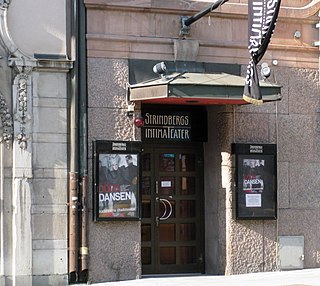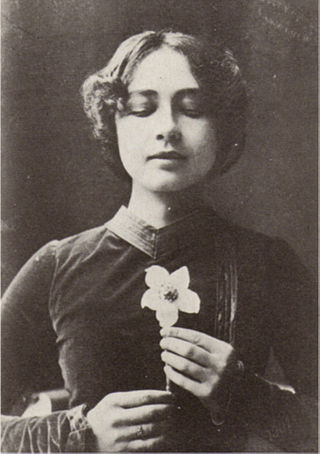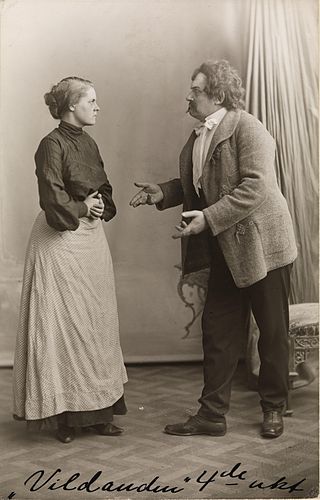
Johan August Strindberg was a Swedish playwright, novelist, poet, essayist, and painter. A prolific writer who often drew directly on his personal experience, Strindberg wrote more than 60 plays and more than 30 works of fiction, autobiography, history, cultural analysis, and politics during his career, which spanned four decades. A bold experimenter and iconoclast throughout his life, he explored a wide range of dramatic methods and purposes, from naturalistic tragedy, monodrama, and historical plays to his anticipations of expressionist and surrealist dramatic techniques. From his earliest work, Strindberg developed innovative forms of dramatic action, language, and visual composition. He is considered the "father" of modern Swedish literature and his The Red Room (1879) has frequently been described as the first modern Swedish novel. In Sweden, Strindberg is known as an essayist, painter, poet, and especially novelist and playwright, but in other countries he is known mostly as a playwright.
This article contains information about the literary events and publications of 1901.

A Dream Play, sometimes staged in English as The Dream Play, is a fantasy play in 14 scenes written in 1901 by the Swedish playwright August Strindberg. It was published in Swedish in 1902 and first performed in Stockholm on 17 April 1907. It remains one of Strindberg's most admired and influential dramas, seen as an important precursor to both dramatic Expressionism and Surrealism.

Jan Wilhelm Malmsjö is a Swedish stage and film actor, musical star and singer. He is married to Marie Göranzon and father to Jonas Malmsjö.

Strindberg's Intimate Theater, is a theatre stage in Stockholm, Sweden.

Inga Sofia Tidblad was a Swedish actress. She was one of the most praised actresses in Swedish theatre.

Den Nationale Scene is the largest theatre in Bergen, Norway. Den Nationale Scene is also one of the oldest permanent theatres in Norway.

Karolina Alfrida ("Frida") Winnerstrand, née Kumlin was a Swedish actress.

Harriet Sofie Bosse was a Swedish–Norwegian actress. A celebrity in her day, Bosse is now most commonly remembered as the third wife of the playwright August Strindberg. Bosse began her career in a minor company run by her forceful older sister Alma Fahlstrøm in Kristiania. Having secured an engagement at the Royal Dramatic Theatre, the main drama venue of Sweden's capital Stockholm, Bosse caught the attention of Strindberg with her intelligent acting and exotic "oriental" appearance.

Egil Næss Eide was a Norwegian silent film actor and director. He appeared in eighteen films between 1913 and 1935, and worked at the National Theatre between 1899 and 1939.

Gerda Ring was a Norwegian stage actress and stage producer. She was the daughter of writer Barbra Ring, and married actor and theatre director Halfdan Christensen in 1922. They were parents of the actors Bab Christensen and Pelle Christensen.
This is a list of August Strindberg's written works.

To Damascus, also known as The Road to Damascus, is a trilogy of plays by the Swedish playwright August Strindberg. The first two parts were published in 1898, with the third following in 1904. It has been described as "Strindberg's most complex play" and as "his greatest play," due to its "synthesis of a wide variety of myths, symbols and ideas with a profound spiritual analysis in a new dramatic form."

Ludovica Magdalena Marie Levy was a Danish actress, theatre director and theatre critic. She toured with theatres in Denmark and Norway, and worked as instructor for Den Nationale Scene in Bergen. She chaired the theatre Sekondteatret in Kristiania from 1899 to 1901, together with her husband Dore Lavik. She founded the touring theatre Nationalturneen in 1907, and toured in Norway with this theatre until 1912.

Dorotheus Olivarius Lavik a.k.a. Dore Lavik was a Norwegian actor and theatre director. He worked as an actor at Den Nationale Scene in Bergen from 1895, and chaired the theatre Sekondteatret in Kristiania from 1899 to 1901, together with his wife Ludovica Levy.
The August Strindberg Repertory Theatre is the resident company at the Gene Frankel Theatre.
Le tue mani is a 1970 Easter song written by Marcello Giombini. It has become popular in Sweden as Dina händer är fulla av blommor, with 1972 Swedish-language lyrics by Lars Åke Lundberg.
Events from the year 1901 in Sweden

Charles Dealtry Locock was a British literary scholar, editor and translator, who wrote on a wide array of subjects, including chess, billiards and croquet. He translated numerous Swedish plays and books of poetry.

Julie Lampe was a Norwegian actress.














